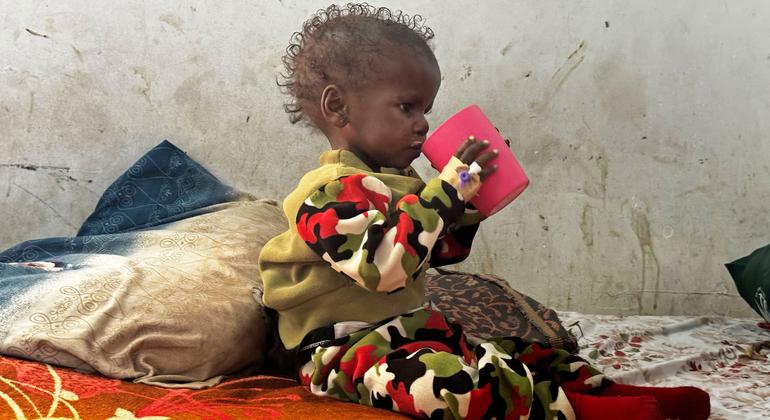Famine is now raging in parts of war-torn Sudan.

The 15-month-long escalating conflict between rival militias “has severely hampered humanitarian access and pushed some areas of North Darfur into famine, particularly in the Zamzam camp for internally displaced persons (IDPs),” the Integrated Food Security Phase Classification (IPC) Famine Assessment Committee said in its latest report. report.
This global initiative, which includes UN agencies, regional partners and aid organizations, classifies food insecurity into five stages, with the fifth stage indicating famine where at least one in five people or households is severely food insecure and faces starvation.
Learn more about famine and the IPC in our explainer This.
Devastation at Zamzam camp
Zamzam camp is located about 12 km south of El Fasher, the capital of North Darfur state, and is one of the largest refugee camps in Sudan, with its population growing rapidly in recent weeks to at least 500,000 people.
“The extent of the devastation caused by the escalating violence in the town of El Fasher is profound and heartbreaking,” the report said.
The report said that persistent, violent and widespread clashes have forced many residents to seek refuge in IDP camps, where they face harsh realities. Basic services are few or non-existent, compounding the hardship of displacement.
Key drivers
Some 320,000 people are believed to have been displaced since mid-April in El Fasher, the report explains. Between 150,000 and 200,000 of them are believed to have moved to Zamzam camp in search of safety, basic services and food since mid-May.
According to the IPC report, “The main causes of famine in Zamzam camp are conflict and lack of humanitarian access, both of which can be immediately remedied with the necessary political will.”
Restrictions on humanitarian access, including deliberate obstructions imposed by parties to the conflict, have severely limited the ability of aid organizations to effectively scale up response efforts.
Things could get worse.
The new report includes a series of recommendations for humanitarian partners and decision-makers to change course.
“The famine will only worsen and become more prolonged if conflict continues and adequate humanitarian and commercial access is not available,” the IPC report, which includes its latest assessment of the hunger situation in the African country, adds to previous updates that warned of impending famine earlier this year.
Since conflict is a major factor causing this famine, the report recommends that every effort should be made to mitigate or resolve potential conflicts among stakeholders in Sudan.
The report states that a cessation of hostilities, along with the sustained restoration of humanitarian access, is essential to reduce the deterioration in food security, nutrition and health conditions faced by people in El Fasher and across Sudan.

Gloomy predictions
In the August-October 2024 forecast period, the IPC warned that the situation could worsen further due to continued food shortages, increased risk of infectious diseases, and very limited access to health care and nutrition services.
The IPC said the risk of waterborne diseases, the possibility of measles outbreaks will be higher due to low vaccination rates and increased malaria incidence associated with the rainy season.
To prevent such predictions, the IPC report recommends, among other things, that warring parties immediately stop all attacks on hospitals, aid groups and civilian infrastructure and ensure that access routes into and within Darfur are open to humanitarian and commercial actors.




